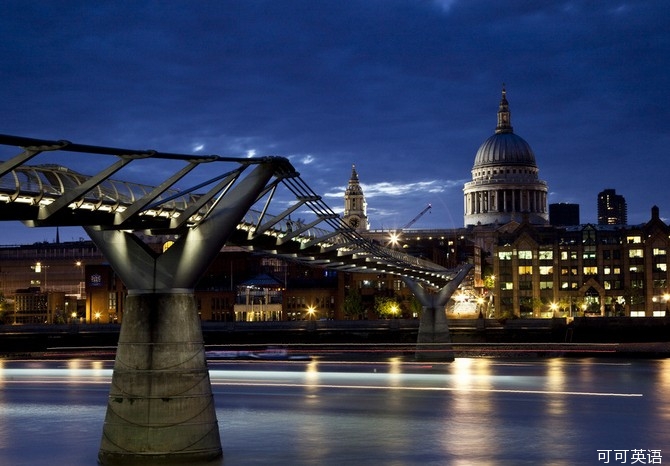
Last week I chaired a Financial Times conference in London, flew to São Paulo and did the same there.
上周,我在伦敦主持了一场英国《金融时报》的会议,然后飞往圣保罗主持了另一场。
Our subject in both was the “millennial generation”, those aged between 18 and 30.
两场会议的主题都是“千禧一代”,也就是现在年龄为18至30岁的那一代人。
I am not in this age bracket, but the conferences prompted the question: if I were starting my career now, would I prefer to do it in the UK capital or Latin America’s most powerful city?
我不是这个年龄段的人,但会议上提出了这个问题:如果现在开始我的职业生涯,我是希望在英国首都还是在那个拉美地区实力最强大的城市开始?
For ease on the eye, you would surely choose London. São Paulo has some greenery, but nothing to compare with London’s parks. While some of London’s suburbs have a brick-and-slate dreariness, São Paulo’s vast stretch of high rises surely appeals only to the most ardent architectural modernists.
从赏心悦目的角度来看,你肯定会选择伦敦。圣保罗也有一些绿化,但与伦敦的公园没法比。虽然伦敦一些郊区有一种砖石建筑的沉闷感,但圣保罗大片的高楼大厦只能吸引那些衷心热爱现代主义建筑的人。
Road journeys in both cities are unpredictable. I was told to leave at least an hour for a five-mile taxi ride in São Paulo. It took 11 minutes, but that was at 7am. One of our mid-morning conference speakers found himself snarled.
两座城市的地面交通都不靠谱。有人告诉我,在圣保罗,打车去五英里外的地方需要至少预留一个小时的时间。实际上那段距离只需要11分钟,但那是在早上七点的时候。我们上午会议的一位演讲者就被堵了很长时间。
The clatter of helicopters, both morning and evening in São Paulo (at one point I counted eight immediately overhead), suggests many of the wealthy prefer not to leave these trips to chance.
早晨和晚上,圣保罗上空直升机的轰鸣声(我有一次数到头顶上同时有8架直升机)表明,很多富人不愿意让运气决定行程需要多长时间。
London is safer. My São Paulo hotel receptionist told me to remove my watch before I went out, unless it was a cheap piece of plastic. (I rolled up my sleeves to show would-be assailants that I don’t own any sort of watch.)
伦敦更加安全。我在圣保罗的酒店前台建议我在出门之前把手表取下来,除非我戴的是一只廉价的塑料手表。(我把袖子卷起让可能袭击我的人看到,我手腕上没有任何手表。)
The statistics say such caution is justified. London had 1.6 murders per 100,000 people in 2009, according to the UN Office on Drugs and Crime. São Paulo had 10.8 – although the homicide rate in both cities has almost halved since 2003.
统计数据表明,这种谨慎是必要的。联合国毒品和犯罪问题办公室(UN Office on Drugs and Crime)数据显示,2009年,伦敦每10万人发生1.6起凶杀案,而圣保罗的这一数字是10.8起——尽管自2003年以来,两座城市的谋杀犯罪率都下降了近一半。
In cultural offerings, London’s advantage is overwhelming, but it has had centuries longer to accumulate its riches. Greater São Paulo has a population of 19m. As Larry Rohter, the veteran New York Times correspondent, points out in his book Brazil on the Rise, in 1870 its population was 31,000. There is some exciting new Brazilian art and the São Paulo Museum of Art has a fine collection.
在文化演出方面,伦敦的优势非常明显,但伦敦之所以文化底蕴更深,是因为它的历史比圣保罗长几个世纪。大圣保罗区有1900万人口。《纽约时报》资深记者拉里•罗特(Larry Rohter)在他的《巴西:一个国家的崛起》(Brazil on the Rise)一书中指出,1870年,大圣保罗的人口还只有3.1万。巴西有一些激动人心的新艺术,圣保罗艺术博物馆(São Paulo Museum of Art)也很不错。
The weather: no contest. It was warmer and sunnier last week at the start of São Paulo’s winter than during London’s fitful summer.
天气方面,伦敦不是圣保罗的对手。伦敦在夏天里也是时冷时热,上周刚刚入冬时的圣保罗,都比夏日的伦敦更暖和、更晴朗。
What is it like to be young and ambitious in the two cities? Both conferences heard from entrepreneurs and community activists, as well as from policy specialists. The young Brazilians were notably more downbeat than their London counterparts. Bia Granja, co-creator of youPIX, “the largest internet culture festival in Brazil”, complained about the lack of tolerance in the country, saying: “I’ve never seen so much prejudice in my life.”
雄心勃勃的年轻人在两座城市的境况如何?两场会议的演讲者中,都有企业家、社区活动人士,以及政策专家。巴西的年轻人明显比伦敦的年轻人更牢骚满腹。“巴西最大的互联网文化社区”youPIX联合创始人比亚•格兰雅(Bia Granja)就抱怨巴西缺乏包容性,他说:“我这辈子就没见识过这么多的偏见。”
This pointed to a startling difference between the two conferences: in spite of São Paulo’s rich racial mix, every speaker and almost every conference delegate was white. The same is true in the city’s upmarket neighbourhoods and restaurants.
这让我想起两次会议的一个明显区别:尽管圣保罗种族构成比较丰富,但每一个发言人和几乎所有与会代表都是白人。在这个城市的高档社区和餐馆里,情况也是如此。
This is not to oversell the UK capital’s tolerance: shortly after our conference there, an Islamic centre was burnt down in the wake of a soldier being hacked to death in the city’s streets.
这并不是说英国首都的包容性值得吹嘘:就在我们的伦敦会议结束后不久,一个伊斯兰中心被烧毁,纵火者是为了报复一名士兵在伦敦街头被砍杀。
But the London panels and the delegates were more varied and optimistic. They were more mobile too, including Bobby Kensah, a UK-trained lawyer with an award for his pro bono work, who now lives in Hong Kong, and Rokhaya Diallo, a French anti-racism campaigner who popped over for the day. Ms Diallo was worried about how her English would hold up. It was fine.
但伦敦的发言者和代表更加多元化,也更加乐观。他们的移动性也更高,比如在英国接受教育、曾因公益工作获奖的律师鲍比•肯萨(Bobby Kensah),目前生活在香港,法国反种族主义者罗哈亚•迪亚洛(Rokhaya Diallo)那天也到场了。迪亚洛担心自己的英语不利于沟通,结果没事儿。
The São Paulo conference began in English, but most of the Brazilian speakers switched to Portuguese. There is nothing wrong with this: why shouldn’t they speak their own language in their own country? The few foreigners present had simultaneous translation headsets.
圣保罗的那场会议开始用的是英语,但大部分巴西的演讲者都改说葡萄牙语了。这倒也天经地义:在自己的国家为什么不能说自己的语言?少数与会的外国人可以戴同声传译耳机。
The problem is that Portuguese is, as one of the Brazilian panellists said, spoken “only in Macau and some places in Africa” (she seemed to disregard Portugal). It is striking how few people in São Paulo, even in luxury hotels and shops, speak any other language, and how few foreign publications are on its newsstands.
但正如一位巴西与会者所说,只有“澳门和非洲一些地方使用”葡萄牙语(她似乎有点看不起葡萄牙语),这是个问题。令人吃惊的是,在圣保罗很少有人说葡萄牙语以外的其他语言,即使是在豪华酒店或高档商店也是如此,报摊上也很少有外语出版物。
Even though Brazil’s growth has slowed, its rich natural and agricultural resources suggest it has brighter prospects than the UK. In manufacturing, Brazil, unlike Britain, makes complete civil aircraft. That is perhaps why its citizens feel less need to look further afield. São Paulo talks about Brazil. London talks about the world.
尽管巴西的增长有所放缓,其丰富的自然资源和农业资源表明,它的未来比英国更加光明。在制造业方面,与英国不同的是,巴西制造的都是民用飞机。巴西民众相对而言更关心身边的事情,原因或许就在这里。在圣保罗,人们谈论巴西,而在伦敦,人们谈论世界。


